|
For some, Palm Sunday was a political event surrounding a political person that led to the greatest, most unexpected revolution the world has ever seen happen. Historically, the week leading up to Jesus’ Passion would have been the time of preparation for Passover, when many Jews from all the surrounding villages were in Jerusalem together. The gospels (Mt 21: 1-11) describe Jesus’ triumphant entrance into Jerusalem to the swaying of palm fronds and shouts of “Hosanna!” These were unmistakable prophetic signs of the Messiah-king, the one many Jews expected would finally overthrow their Roman overlords and re-establish Israel’s reign on earth, perhaps even violently—as a group called the “Zealots” expected. Yet there is a further symbol to this story: Jesus riding on a colt or ass, the sign of a humble and meek king. Jesus did not become the king they expected, but instead, the one God wanted. As Pope Francis said in his 2016 homily on the Feast of Christ the King, “The Gospel in fact presents the kingship of Jesus as the culmination of his saving work, and it does so in a surprising way. ‘The Christ of God, the Chosen One, the King’ (Lk 23:35,37) appears without power or glory: he is on the cross, where he seems more to be conquered than conqueror.” Like Jesus’ followers then, today we are susceptible to temptations of limited expectations. It is possible to see Jesus merely as a political and ethical teacher who died a martyr’s death and nothing else. On the other hand, we might project Jesus’ kingdom to a purely “other-worldly” realm. Since Jesus apparently wasn’t setting up his kingdom on earth (so we assume), we are tempted to sanitize Jesus of any “worldly” political or practical implications, and simply assume political engagement has limited place, or even runs counter to our task of evangelization. As Pope Pius XI wrote in his establishment of the Feast of Christ the King, “It would be a grave error…to say that Christ has no authority whatever in civil affairs, since, by virtue of the absolute empire over all creatures committed to him by the Father, all things are in his power…although he himself disdained to possess or to care for earthly goods, he did not, nor does he today, interfere with those who possess them.” Both interpretations—that Jesus was strictly political or that his work was merely “not of this world”—fail to take seriously not only Jesus’ public ministry and preaching, but the truly earth-shattering consequences of Jesus’ kingship won at the cross. The Catechism of the Catholic Church states that Christ, “exercises his kingship by drawing all men to himself through his death and Resurrection.” Jesus’ death and Resurrection are, simply, God’s victory over the world’s powers of sin and death so as to bring about the restoration of God’s people. To say yes to Jesus’ Resurrection is to say yes to life as part of a new creation and kingdom that starts now. Paschal faith involves the risk of making mistakes, being misunderstood or ridiculed, of not conforming to the expectations of the surrounding culture in order to expect something greater. It involves joining in the kingship of Christ in serving others, something we are able to share in as a result of our baptism. As powers of sin and death today loom heavy on our hearts, it is not enough to “have faith” but to do nothing. Following Christ calls us to witness to our faith in practical ways with full conviction because of Christ’s own experience of suffering, death, and Resurrection that has transformed our fundamental orientation to the world. As Christians, we desire peace, healing, reconciliation, and restoration. We serve our King by building up his kingdom on earth. Pope Francis challenges us, “A people who are holy…who have Jesus as their King, are called to follow his way of tangible love; they are called to ask themselves, each one each day: “What does love ask of me, where is it urging me to go? What answer am I giving Jesus with my life?” For more Lenten and Easter resources, please click here.
0 Comments
Last week a friend and I were watching football together and we started talking about how unprecedented of a year 2016 has been. At that moment it seemed like anything was possible—the Cubs were headed to the World Series, a feat that last happened in 1945! My friend even joked that maybe the Bears would win the Super Bowl! Well the Cubs have won the World Series, first time since 1908, and the Bears still look dubious for the Super Bowl. There are countless examples of how different this year has been, but none more so than our current presidential election. This long and winding election will finally be over and our Facebook newsfeeds will return to their usual mix of cat photos and recipe videos. During this election cycle I have often been asked by a lot of my friends what a Catholic is supposed to do. Some people have made up their minds completely independent of the magisterium of the Church, while others have decided to completely remove themselves in the process by not voting.
As faithful Catholics, participating in our electoral system requires a formation of conscience. It demands that one know and understand the different issues and the Church's teachings of various issues. It is not something that can be broken down into a simple check box format, but demands an understanding of the teachings of the Church. In response to this situation, the bishops of the United States have written a pastoral letter, Forming Consciences for Faithful Citizenship outlining several key teachings that are important to today's political climate. We at the Catholic Apostolate Center have created a special portal dedicated to this document. I highly recommend visiting the page and exploring its various topics. Exploring these issues and positions is critical to making an informed decision. The document goes into detail regarding the very nature of Catholic involvement in our politics. This process includes a formation of oneself both as an apostle and a citizen. A few months ago, Bishop Robert W. McElroy, Bishop of San Diego, wrote about this formation. Saying "It is for this reason that the central foundation for an ethic of discipleship in voting for the Catholic community in the United States today lies not in the embrace of any one issue or set of issues but rather in a process of spiritual and moral conversion about the very nature of politics itself." The other common thing I hear from some people is that "so many people vote, mine can’t possibly matter." These individuals are choosing not to participate in their right to vote as a citizen of this country. Everyone has that right to not participate, but before making this decision there are things to consider. One should remember that the Church encourages our participation. Cardinal Donald Wuerl, Archbishop of Washington expanded on this further last week in a column in The Catholic Standard discussing Forming Consciences for Faithful Citizenship "Civic participation is not a simple task for faithful citizens It requires a willingness to listen to Catholic social teaching, and then conscientiously apply it to the political sphere. We must pray for guidance in our civic choices so as to uphold the dignity of all life and the common good. We must learn about the issues and where candidates stand. We must vote in recognition of the important contribution that every voice makes on Election Day, and we must remain engaged to build a civilization of justice, peace and caring for one another. Tonight, we should know the results of the election and a portion of the country will be disappointed. Whoever is elected will have the enormous task of unifying this country and moving forward. That task will not be an easy one, but is possible. One only needs to look at the example Pope Francis gave last week in Sweden. He traveled there to commemorate the 500th anniversary of the Protestant Reformation and spoke of the hope for reconciliation between Catholics and Lutherans: “We have the opportunity to mend a critical moment of our history by moving beyond the controversies and disagreements that have often prevented us from understanding one another.” Catholics in the United States are also called to similarly work hard to build bridges to our neighbors. I have no doubt that this country will unify but it will take understanding, prayer, and time. 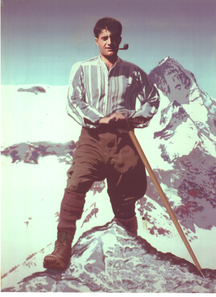 This upcoming summer, the Church will be celebrating World Youth Day in Kraków. The Church invites all of us, not just those pilgrims in Poland, to celebrate and participate in this great event. The Catholic Apostolate Center announced a few weeks ago that it will be partnering with the USCCB and the Archdiocese of Washington in a number of World Youth Day celebrations both here and abroad, including the event “Kraków in the Capital,” which celebrates World Youth Day stateside in Washington, D.C. As I was helping prepare for the celebration, I came across the fact that the body of Bl. Pier Giorgio Frassati will be present for the World Youth Day celebrations in Kraków. I knew very little about this extraordinary young man and I decided that I needed to learn about him. I feel like my introduction to him was perfect timing. Much like Pier Giorgio, I have a great love for the outdoors and for sports. I will gladly spend hours watching games and discussing Sidney Crosby and my Pittsburgh Penguins, the New York Giants, and why the 1969 Mets were the greatest World Series team. Some of my fondest memories include hiking in the Scottish Highlands, climbing mountains in the Adirondacks, and backpacking in New Mexico. I've always regarded these as great activities, but found it challenging to incorporate them into my spiritual life. I knew that being in nature connected me closer to God, but did not know how that could affect my spiritual journey. This young man showed me how. Pier Giorgio Frassati was born to a prominent family in Torino, Italy on April 6, 1901. His father was the founder of the La Stampa national newspaper (which is still in print today) and was very active in national politics as a member of left wing parties. Growing up, Pier Giorgio took an active role in his life of faith and developed a deep spiritual life. He could often be found praying before the Blessed Sacrament and reflecting on the Beatitudes. During World War I, he served the sick and helped servicemen reintegrate back into society. Like his father, Pier Giorgio got involved with politics but joined the People's Party, which was based on Rerum Novarum and Catholic Social Teaching. He would often be found climbing mountains, going to the theater and to the opera, but never let these pastimes interrupt his service to the poor and the outcast. He would be seen giving bread and sometimes his own clothing to the beggars in the streets. While still a young man, Pier Giorgio was photographed climbing a mountain. He signed the photograph 'Verso L'Alto', which means 'Go to the Heights'. This would serve as his personal motto and means more than simply mountain climbing. It is also a figure speech referring to the climb towards Christ. Pier Giorgio felt that he was drawn to the heights of the Beatitudes and to the Blessed Sacrament. He encouraged all those around him to also climb to these heights of the spiritual life. Pier Giorgio's family disapproved of his activities and of his faith. They could not understand Pier Giorgio's passion for the poor and for the spiritual life. As he grew older, he grew deeper in his devotion and eventually joined the Third Order of Saint Dominic (Lay Dominicans) in 1922. Before graduating from university, Pier Giorgio contracted a very aggressive form of polio and grew extremely ill. It was during this short period that his grandmother passed away, drawing ire from his family because they felt that Pier Giorgio did not show enough grief for her death due to his own illness. On the night before Pier Giorgio himself passed away, he requested that his medication be given to a poor man he had been visiting. Pier Giorgio succumbed to his illness on July 24, 1925. His family expected very few people to come to his funeral, only some family and personal friends. When the family departed for the funeral, they were completely stunned to find the streets completely lined with thousands of people whom he had cared for. Simultaneously, the people lining the streets were shocked to find that he was from such a prominent family. Pier Giorgio's legacy continued not only in Torino, but also throughout the world. While visiting Torino in 1989, Saint John Paul II made a pilgrimage to his tomb. A year later, on May 20th, Pier Giorgio Frassati was beatified in Saint Peter Square. His body was then moved from the family plot and reinterred in the Cathedral of Torino for pilgrims to visit. St. John Paul II said, "He (Frassati) testifies that holiness is possible for everyone". In researching his life, I have found encouragement from this great man. He shows us how to have zeal not only for life, but also for our faith. He gives us courage and inspiration. As I prepare for the World Youth Day celebrations, I look forward to diving deeper into the life and spirituality of Pier Giorgio. Blessed Pier Giorgio Frassati, pray for us! Paul boldly reminds Christians, “our citizenship is in heaven” (Phil 3:20). In a sense, our single most political act on this earth is not who we vote for in the next election, but our Baptism. In baptism, we discover our truest identity as adopted sons and daughters of God, and together become “one in Christ Jesus” (Galatians 3:27-28). But as citizens of heaven, we also live as “aliens and sojourners” (1 Peter 2:11). This Jubilee Year of Mercy issues an invitation and challenge for Catholics to transform what society regards as ‘political problems with political solutions’ into encounters with God’s grace and mercy. Borrowing a phrase from Biblical scholar Walter Brueggemann, Christians are not simply called to meet issues with more political machination, but greater “prophetic imagination.” When Christians do not actively imagine and enact truthful and merciful alternatives to social evils, pragmatism and deceit can lay deep roots in our society. In the Book of Leviticus, an important aspect of the ancient Jubilee Year involves extending mercy to a group of people the Bible calls resident aliens, outsiders living among the Israelites who belonged to no tribe. They occupied a vulnerable position in society and were not always welcomed, but God’s law was meant to protect them as legal equals (cf. Ex 12:49; Lev 24:22). Today our Church takes seriously the responsibility to stand up for the human dignity of migrants and refugees. While speaking on the topic of pastoral care for migrants and itinerant peoples, Pope Francis expressed his hope that, “our Christian communities really be places of hospitality, listening, and communion.” Hospitality In Leviticus 19, God instructs Moses and the Israelites about harvesting the land, not to “reap the field to its very edge,” for, “… these things you shall leave for the poor and the alien” (Lev 19:9,10, cf. Deut 24:20-21). A problem many of us succumb to in a consumerist culture (myself included) is living without margin. We max out our schedules and credit cards so that we simply cannot make room in our day or budget to give freely, or receive someone in need when opportunity arises. As Pope Francis recently put it, “If the Jubilee doesn’t arrive to the pockets, it’s not a true Jubilee.” The scripture and tradition of the Church prescribe counter-cultural hospitality toward the stranger. Exemplified in monastic tradition, the Rule of Benedict in Chapter 53 puts forth Jesus’ words, “Let all guests who arrive be received like Christ” (Matthew 25:35). Moreover, in a culture where nearly every human experience is branded and marketed, we should not confuse hospitality with customer service. Listening “Listen… and administer true justice to both parties even if one of them is a resident alien… Give ear to the lowly and to the great alike” (Deut 1:16,17). There is no justice or mercy without listening to the oppressed and marginalized. The theologian Dietrich Bonhoeffer once wrote: “The first service that one owes to others in the fellowship consists in listening to them. . . It is God’s love for us that He not only gave us His Word but also lends us His ear. . . Many people are looking for an ear that will listen. They do not find it among Christians, because these Christians are talking where they should be listening. But he who can no longer listen to his brother will soon be no longer listening to God either” (Life Together. New York: Harper & Row). When we listen, we may even discover someone who is no longer a stranger but a friend. Communion God had to remind the Israelites, “You shall love the alien as yourself; for you too were once aliens in the land of Egypt,” (Lev 19:34). The New Testament reiterates: “Once you were ‘no people’ but now you are ‘God’s people’; you ‘had not received mercy,’ but now you have received mercy” (1 Peter 2:10). Pope Francis powerfully stated that communion cannot exist where Christians seek to build walls instead of bridges. Communion happens through solidarity and accompaniment, not the gospel of, “God helps those who help themselves.” As Catholics, our communion is best expressed through the Holy Eucharist, where we “participate with the whole community in the Lord’s own sacrifice” (CCC 1322). Recent celebrations of the Mass across the USA-Mexico border witness the power of the Eucharist to unite Christians separated along national/political divides. In a climate of fear and self-preservation, the Eucharist consumes us, lest we consume each other. Political debates will rage this year. As Christians, let us consider how the Jubilee of Mercy cannot be separated from our particular concern for migrants and refugees in the form of the prophetic witness of Christian hospitality, listening, and communion. To learn more about the Jubilee of Mercy, visit our free resource page by clicking here. Like many of you, I have been following Pope Francis’ visit rather closely. Undoubtedly, his presence has impacted each of us in different ways, and I am very excited about the words and actions to come in the days ahead. As I sit here in my office with an unusual lull in activity, I am struck by two ideas our Holy Father has articulated, but are getting very little play in the news. The first idea comes from his address to the U.S. Congress. While highlighting Abraham Lincoln, he emphasized unity, and Lincoln’s great struggle to bring union, freedom, and peace to a divided and war ravaged nation. Francis named the delicate balance of rejecting fundamentalism that threatens these great virtues that Lincoln fought for, while not sacrificing those same liberties in an effort to defeat these threats. Within that balance, our Pope names the danger of seeing the world in non-negotiable black and white. I am particularly caught by this because I am often far too quick to judge, especially in a political or theological situation. If people don’t think like me, I reject their ideas as closed-minded nonsense. This line of thinking is all too common in our society. 24-hour news channels that cater to particular political views, blogs and podcasts that target niche groups, and seemingly endless gridlock in Washington reiterates to us constantly that dialogue is overrated, and if you don’t agree with me I have no time for you. Unfortunately, there is a great danger in seeing things in black and white. When we see things in black and white we claim the moral compass; we claim to know what is righteous and what is sin. And when we get trapped in that line of thinking, there is no more room for anyone else in our lives, not even God. We declare our independence from what we view as wrong only to discover that we can no longer discuss and dialogue with those around us. Nothing anyone has to say is worth listening to. Here is where the Pope’s message strikes deepest. President Lincoln in his first and primary purpose fought the Civil War to preserve the union, to keep these United States from dividing into isolation. Lincoln chose openness and dialogue, and that is where Pope Francis is calling all of us today. For too long I have looked down on those I disagree with thinking they are not as nuanced or educated as I am. Yet God speaks in history, and if I fail to speak with and be open to my sisters and brothers, how can I hear God? How can I grow? And most importantly, how can I live in union as a member of the Church and as a citizen of this country, if I fail to dialogue and work in communion to realize the Kingdom of God and build a more perfect union? The second chord that struck me came from the address to the U.S. Bishops at St. Matthew’s Cathedral. While watching the reflection, I was unsure what the Pope was going to say, but I was deeply moved by the compassionate urgency he had while addressing the mission of the church in the United States. He acknowledged the heavy workload, the damaging reality of the sexual abuse crisis, and the corrosiveness of secular culture. However, he made very clear that it was in this context that all of us who minister to God’s people are charged with finding some way to evangelize, to bring people into a relationship with Jesus Christ as his disciples. In my new job I am struggling to engage young adults in their 20’s and 30’s. I have a loose plan, and we are having our first event in a few weeks. However, like anything new, I am having doubts about how successful it will be in bringing young adults back to Christ. I went through all of this training and education and I don’t have a sure answer for how to lead people to discipleship. What if no one shows up? Through that cloud of doubt, there was the Pope speaking to a cathedral full of bishops, but yet also speaking to my fears. Evangelization is the most important work. We must keep trying. We must keep praying, and we must keep going. Only God builds the Church, but we must keep removing barriers and facilitating encounter, so that the seeds of faith may be watered and eventually produce much fruit. These last few days have already made for an incredible papal visit. The headlines will undoubtedly continue to be filled with the Pope’s stance on particular issues, and on his discussions at the World Meeting of Families. Through all of that, try to listen to the words surrounding the hot buttoned issues because there Francis is not telling us what to believe, he is rather telling us how to live as human beings. Pope Francis, in his straight talk and unassuming persona, has figured out how to remove those barriers to faith, and in his words over the last few days, I can’t help but feel that Christ has spoken directly to me. Editor's Note: This post was originally published on Catholic How and was reprinted with permission
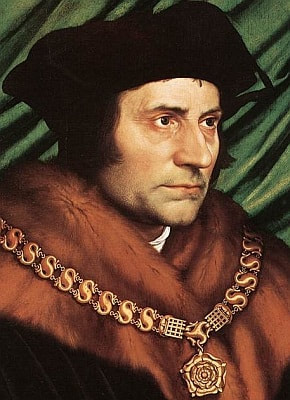 Back in 2002, my 8th grade religion teacher assigned my class the task of choosing a saint for Confirmation and then writing about why we chose the person. After deciding that I would research a patron of lawyers and politicians, I came across a name: St. Thomas More. He seemed like an interesting person whose work and faith were integral in his life. His feast day is on June 22, and his life and personality can offer us something to apply to ourselves today. After researching his life, seemed even more interesting to me, primarily because of how history and faith intertwine in his life. A brief history on him: St. Thomas More was Chancellor to Henry VIII and a personal friend. He was a devout Catholic and criticized the King about his divorce from his first wife, Catherine of Aragon. This was treason, but he was willing to put aside friendship and his life for his convictions, and was not harmed. But, when Henry VIII declared himself the head of the Church of England, separating himself from the papacy, all in the government were to sign signifying their agreement to this act. Thomas More refused. Because of this blatant act of treason, Thomas was imprisoned in the Tower of London and eventually executed along with Bishop John Fisher on July 6, 1535. In both the Anglican and Catholic liturgical calendars, he is celebrated as a saint for his willingness to being martyred for his faith. Thomas More is considered to be a “Man for all Seasons” because of his ability to be a philosopher, politician, lawyer, devout Catholic, and loving father of 4 children. The man was considered a model civil politician in English Parliament and respected by some of his most hated rivals for his integrity. It was due to his integrity that he was martyred. Can we willingly give our lives due to our personal integrity and unwillingness to move away from what faith teaches us? Are we willing to deal with the ridicule and criticism for our beliefs? Thomas More was a person of such integrity that he was willing to die instead of lie and go against his beliefs. St. Pope John Paul II considered him such an important and needed saint for the 21st century that he declared him the patron saint for political leaders. Thomas More’s civility and statesmanship should serve as a reminder for those in political office. Despite differences that people may have with each other as politicians, love and respect of those with different viewpoints is imperative. Thomas More was one who disagreed with many, but was always willing to work with others and be a truly welcoming and hospitable person. It is my hope every time that I ask for the intercession of St. Thomas More that I and all those who care about political life are willing to listen to those we disagree with and still love the person. It is a difficult task, but with the assistance of the saints, such as Thomas More, we can work for the betterment of society together. Jonathan Sitko is the Program Manager of the Catholic Apostolate Center.
Following the new Congress being sworn into office January 3rd, Inauguration Day is now upon us. On this day, hundreds of thousands turn out on the National Mall in Washington and millions tune in on television to watch the great spectacle. President Barack Obama will raise his right hand and place his left on two stacked Bibles as he takes the oath of office for another four-year term.
Inauguration Days are joyous for some but disappointing for others. Yet as Catholics, we also understand that regardless of who wins the oval office, Christ has already won. Because of Christ’s victory, we are called to act with charity toward our fellow citizens and even those who are not citizens. Sacrificial love transcends party lines and political boundaries. This day is a reminder to us that our country is in need of being rooted in God and in our faith. Yet it cannot be done by one human being and through political methods. One of the unique and fascinating traits of St. Vincent Pallotti, founder of the Union of Catholic Apostolate, was his ability to get others involved in the mission of the Church. He understood that an internal revitalization of the Church or renewal of faith was not going to occur by a single individual. Rather, he envisioned the renewal of the Church as everyone’s task – everyone’s mission. St. Vincent Pallotti formed a small group of followers at the beginning of his ministry to use their talents to evangelize and spread the good news of the Gospel. We too are called to use the skills and talents that God has given us and as the motto of the Catholic Apostolate Center states, to “revive faith, rekindle love and form apostles.” This is what it means to participate in the universal apostolate. And since we are created “in the image and likeness of God,” each of us has spiritual gifts that can touch the hearts of others. Consider the official motto of our nation: “In God we trust.” What God asks of us is that we trust in Him at all times, whatever the circumstances and in whatever situation, including whoever is in office. We must submit to His will as the all-knowing, all-powerful and ever-living God. All we need to know about our future and the future of our nation is contained within the trust of His will. We may have the tendency to want to change the direction and determine the course because we think we know it all. But our intelligence and judgment will only take us so far because God we cannot perceive the things God has in store by our sheer intellect. His ways are spiritually discerned. “‘For my thoughts are not your thoughts, nor are your ways my ways,’ declares the Lord.” (Isaiah 55:8) The United States has long declared where this nation’s trust resides. Our country has historically placed trust in God. Presidents come and go and so does inaugural hype and rhetoric. But the message of Christ and Christ himself are the same yesterday, today and forever (cf. Hebrews 13:8). Sarah Morris is a senior Politics major at The Catholic University of America. Decisions made in the voting booth are deeply personal and reflect a combination of our experiences and beliefs. And as Catholic American citizens, now is a critical time. The outcome of the presidential election will have far-reaching consequences and it is our responsibility to seriously consider our choice of leaders and policies that will guide our nation and our state.
Catholic voters are once again caught between their desire to participate in civic life and the choice of candidates for elected office falls short of a vision of the common good as rich and full as Catholic social teaching presents. Consequently, many have become subject to the mentality that being Catholic and politically active are incompatible. But this is not so. Catholics are called to understand and accept the Church’s teaching as a means of becoming more engaged in political life. It may be challenging, but it is something we have to wrestle with. At an address this past month, Archbishop Chaput of Philadelphia said, “We believe in the separation of Church and State, but that is not the same thing as separation between faith and politics. Faith is what we believe, politics is how we act.” He advised Catholics to “apply the principles of Catholic social teaching – such as the common good and subsidiarity”, to their voting decisions. We have the duty as citizens to participate in our own governments for the sake of the common good. By not doing so, we abandon the political process and risk unjust laws being formed. Poorly formed legislation and leadership may come about anyway, but it should not come about as the result of Catholics disregarding the process. Casting an informed vote is one of the best things we as Catholic citizens can do for our country. It is the duty of citizens to contribute – along with the civil authorities – to the good of society in a spirit of truth, justice, solidarity and freedom. “The love and service of one’s country follow from the duty of gratitude and belong to the order of charity" (CCC 2239). And so as Catholic citizens, we enlighten and develop our consciences as citizens in accordance with the principles of Catholic Social Teaching. One straightforward and immediate way Catholic voters can make a meaningful contribution to public discourse is to draw the larger public’s attention to issues that are essential to Catholic social thought. The most essential of these is the dignity of every human person and each one’s basic right to life from conception to natural death. Respect for human dignity has an essential role in the respect of all human life, especially the fundamental right to life. It is a natural principle that is supported by our beliefs; it is our faith, as His Holiness states in Porta Fidei, that “opens our eyes to human life in all its grandeur and beauty.” As Catholic voters, we have to see ourselves as bridge builders. According to Bishop Richard Pates of Des Moines, Iowa, and Chairman of the Committee on International Justice and Peace for the USCCB, “The Catholic vision is one of collaboration, not coercion, among individuals, governments, businesses and other institutions.” Voting in this election is not based on profit or having a winning ideology. Our “Catholic vision” is one that creates an environment in which all people can develop and ultimately flourish. Along with tens of millions of fellow citizens, I urge you, Catholic voters, to cast your ballot today. Commit yourself to creating conditions that fully respect the dignity God has bestowed upon all of us. Our political responsibility doesn't stop at the polls this Election Day. We must always respond to the social issues, locally and nationally, that affect the dignity in which we are all created. Sarah Morris is a senior Politics major at The Catholic University of America. In the recent “Faithful Citizenship” lecture on the foundations of Catholic political theory, Dr. Stephen Schneck (CUA politics professor and Director of the Institute for Policy Research & Catholic Studies) presented Thomism as an alternative to the radical positions held by groups at opposing ends of the ideological spectrum. While the two extremes disagree about particulars, according to Schneck, both “Ayn Rand conservatives” and “pro-choice liberals” are motivated by a “hyper-individualism,” which is in direct contradiction to the social teaching of the Church. If we are to believe Dr. Schneck’s premise, it seems that faithful Christians are left between a rock and a hard place in the current political landscape. Thankfully, the political philosophy of St. Thomas Aquinas offers Christians an authentic alternative.
Synthesizing ecclesiology and political philosophy, St. Thomas understood the nature of a political community as being deeply Christological. Drawing from St. Paul’s imagery, St. Thomas perceived the political community as a reflection of the Mystical Body of Christ: “For as in one body we have many parts, and all the parts do not have the same function, so we, though many, are one body in Christ and individually parts of one another” (Romans 12:3-5). This image of a political community as a corporate whole is in stark contrast to the Lockean image of a group of individuals that is held together solely by an externally imposed contract, rather than internal unity. The Thomistic political community is held together by solidarity among its members, a unitive desire for the wellbeing of the whole, rather than individual self-interest. In Thomistic philosophy, the object of this desire is referred to as the commonweal, or the common good. But why place more importance on the common good than individual goods? Because, as Aristotle said and St. Thomas affirmed, we are political and social beings; the meaning of our lives transcends beyond who we are as individuals. As John Donne observed in his oft-cited Meditation XVII, “No man is an island, entire of itself; every man is a piece of the continent, a part of the main.” After Dr. Schneck had concluded his lecture, a question-and-answer session followed. A young woman from the back of the lecture hall politely asked, “What can we do as individuals to combat the pervasiveness of hyper-individualism in our society?” Ironically, this question demonstrates what is at the root of the problem of hyper-individualism: we cannot cease thinking of ourselves primarily as individuals! This shift in thinking does not mean that we must give up our own individual rights; to the contrary, our solidarity with one another should engender a greater appreciation for the individual rights of a group’s collective members. In fact, it is our individual freedoms that allow us to choose how we prioritize our actions and intentions. Through our individual liberties, we are given the opportunity to look and act beyond ourselves. During this Easter Season, may we all be reminded that through our baptism and as members of Christ’s Body, we have truly been raised with Him! (cf. Ephesians 2:6) In order to more fully participate in God’s divine economy – i.e. His comprehensive plan for Creation – may we “not think of [ourselves] more highly than [we] ought to think” (Romans 12:3), but instead humbly unite ourselves to our fellow members in the One Body of Christ. Brett Garland is the Program Development Coordinator for the Catholic Apostolate Center. “The saddest thing in life is wasted talent,
and the choices that you make will shape your life forever.” -A Bronx Tale I cannot count the times in my life where I have felt lesser in the spiritual sphere because someone “outshined” me. I often thought the Church was so boring, homogenous. I felt suppressed, and like I was being asked to be someone I just was not. Recently, I had a shaky experience with a church-affiliated organization, where I felt completely displaced, unheard and unappreciated. I even contemplated my course of study. Having just returned from 3 months abroad, away from everything familiar and with an abundance of solitude, this situation struck a raw nerve. Where am I going? What is God calling me to? And how much of what is being said and done is a reflection of my identity and place in the Church and how much is pure politics or misunderstanding? Theology is my passion, and the Church is something I believe in firmly. I hope to one day build a career around bringing my skills and ideas to this institution. But I was doubting myself. I knew that all of this could not be a matter of my inadequacy in the eyes of God. So why did I feel like someone took a garden hose to the fire burning inside me? Luckily, it only took a sit-down with one of my most respected professors to kick-start me again. He reminded me of my skills, talents, and charisms, and that they differ from person to person; and mine are certainly no mistake. These every day scenarios can chase some of the most passionate youth away from the areas they may be called to enhance or reform. The New Evangelization calls us to recognize the need for every type of person. It’s what makes us communal. How is evangelization, family life, or any other cosmopolitan activity possible with only one personality type allowed? It isn’t. Christifideles Laici speaks powerfully to this, clarifying that each and every forte and ability is valued: “They are not called to abandon the position that they have in the world. Baptism does not take them from the world at all…He entrusts a vocation to them that properly concerns their situation in the world.” For some reason, so many of us are scared that what God calls us to must be the most gruesome and displeasing situation. I find myself constantly asking God “PLEASE DO NOT CALL ME TO A, B, OR C!” the kicker; of course, being that God isn’t out to make my life miserable… I’m called to act in accordance with the talents and abilities I have. So, if God calls us to use our skills and capacities to better and bring to order the world, what happens when institutions or governments begin to inhibit this? Pope Benedict stood before Parliament and defended our right as people of faith to keep our faith alive in our careers and all decisions following. As head of the Roman Catholic Church, one would assume that perhaps he wants to make sure "his own" are being heard, but it seems he contends that anyone with a well-formed conscience is inherently free and bound to follow it. We expect that our leaders will lead us toward good will and prosperity. Working toward any noble cause is not easy. However, if we allow God into our lives solely for our personal missions and hardships, why are we not surprised that we do not receive the same guidance and grace outside? We must seek it. And to seek it, there must be freedom, and even encouragement, to do so. What better time to let God back in? We may be pleasantly surprised by the Spirit’s ability to emerge through the cracks of brokenness,[1] and allow us a deeper-rooted ethical cause. [1] Himes, Michael J. Doing the Truth in Love: Conversations about God, Relationships, and Service. New York: Paulist, 1995. p. 47 Angela Chiappetta is the Program Development Associate for the Catholic Apostolate Center. |
Details
Archives
July 2024
Categories
All
|
About |
Media |
© COPYRIGHT 2024 | ALL RIGHTS RESERVED

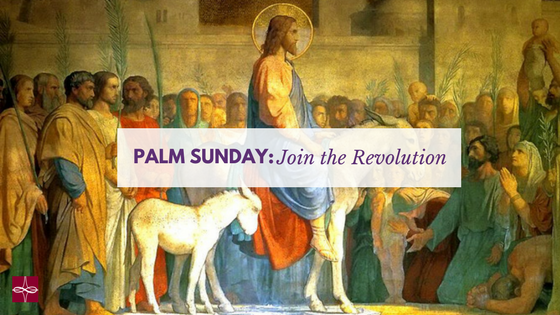

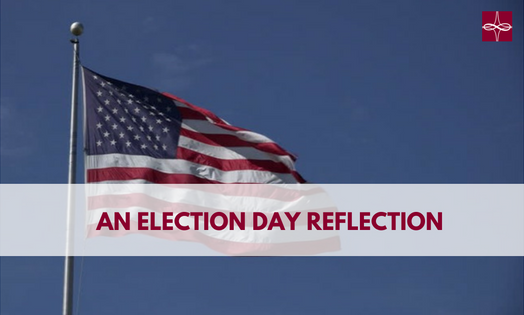
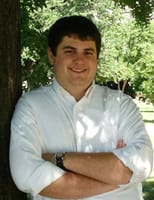
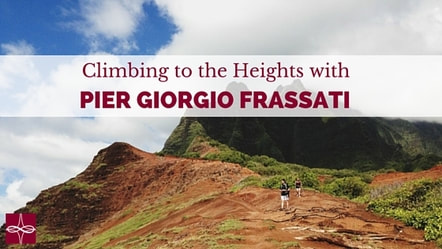
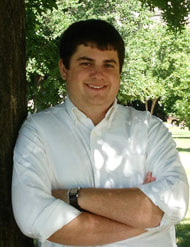
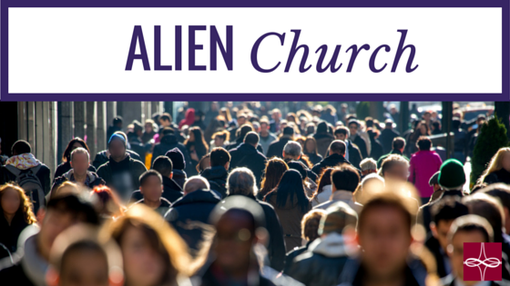

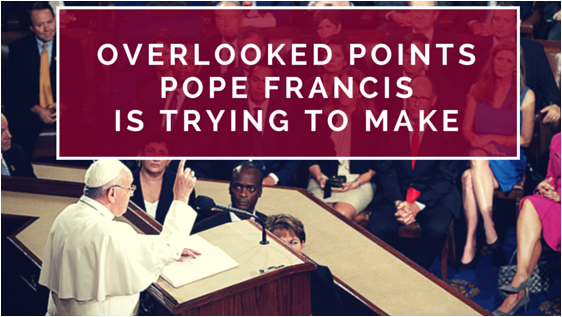

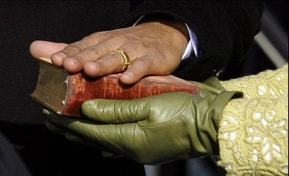
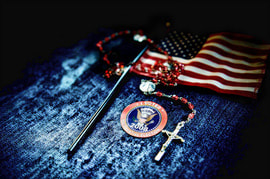
 RSS Feed
RSS Feed